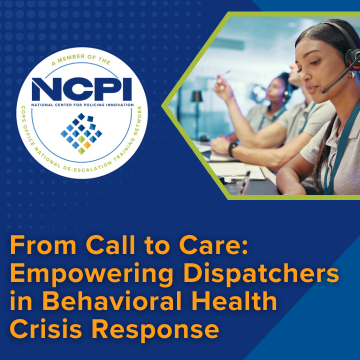
From Call to Care: Empowering Dispatchers in Behavioral Health Crisis Response

This recorded webinar is offered as part of the COPS Office National De-escalation Training Network.
It is presented by Amanda Stamps, Senior Regional Director of Operations, Community Bridges Inc., Matthew Moody, M.S., Principal Consultant, Advocates for Human Potential, Inc, and Marianne Halbert, J.D., Programs Manager, CIT International.
This webinar explores the vital role dispatchers play in de-escalation, caller safety, and effective coordination with crisis teams and first responders. With the addition of community-based crisis options across the country, communications personnel have the opportunity now more than ever to change the outcome of the crisis. Participants will learn best practices for identifying behavioral health concerns, applying trauma-informed communication, and ensuring callers receive the most appropriate resources. Participants will also gain self-care strategies to manage stress and protect their own well-being while handling these challenging calls. By equipping dispatchers with the right tools and training, communities can improve outcomes, reduce risks, and strengthen the crisis response system from the very first call.
Presenters Amanda Stamps, Matthew Moody, M.S., and Marianne Halbert, J.D., bring extensive expertise in crisis intervention and emergency communications. Amanda Stamps retired from the Mesa Police Department after spending 26 years pursuing her passion for helping others and currently works as the Senior Director of Regional Operations over community-based crisis mobile teams for Community Bridges Inc. and owns Practical Law Enforcement Crisis Solutions LLC. Matthew Moody, M.S., is a principal consultant at Advocates for Human Potential (AHP) with 15 years of experience in the crisis mental health and 988 fields and has led the creation of seven 911 to 988 diversion programs across the U.S. and Canada. Marianne Halbert, J.D., is the Programs Manager at CIT International and oversees all of CIT International’s trainings, certifications, and technical assistance programs, including Program Certification, the Coordinator Certification Course, CIT Curriculum Train-the-Trainer, and CIT Support Training for 911/Emergency Communications.
Target Audience: This recorded webinar is designed specifically for emergency communications professionals including 911 call-takers, dispatchers, and those in supervisory roles within emergency communications. It is also appropriate for any public safety professional involved in behavioral health crisis response who interacts with emergency communications personnel as part of their duties.
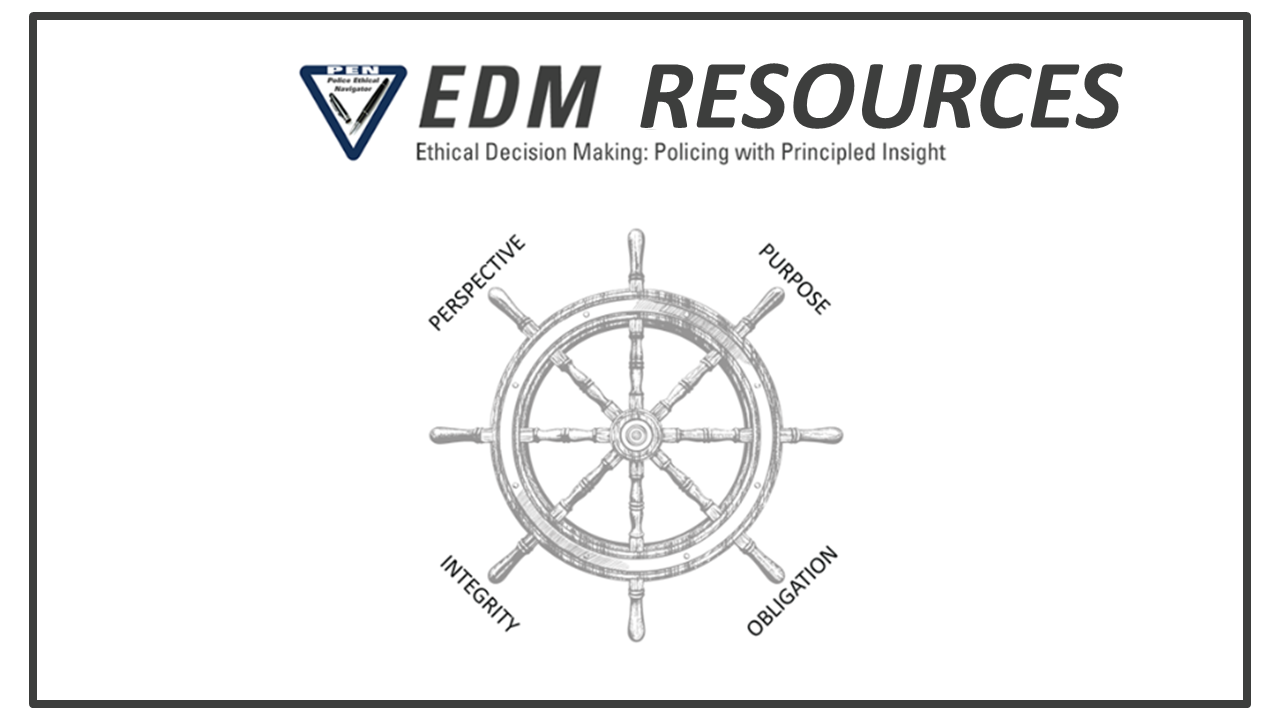
For policing professionals, public trust, integrity, and liability are constantly on the line. Often the difference between effective community policing and the failure of an agency’s public-safety mission is determined by the decisions of individual officers. With so much at stake, stressing police ethics as simply a means of discouraging bad behavior is wholly insufficient. Effective policing requires changing the concept of police ethics from merely an after-thought, to a controlling insight that informs and guides police practitioners from an internal, personal capacity. In one of its most impactful and rewarding endeavors to date, NCPI partnered with the USDOJ, COPS Office to address this fundamental shift through the Ethical Decision Making: Policing with Principled Insight (EDM:PPI) program. EDM:PPI is a multi-faceted program that is timeless, powerful, and exceptionally relevant for the professionals facing the realities of policing in the 21st century.
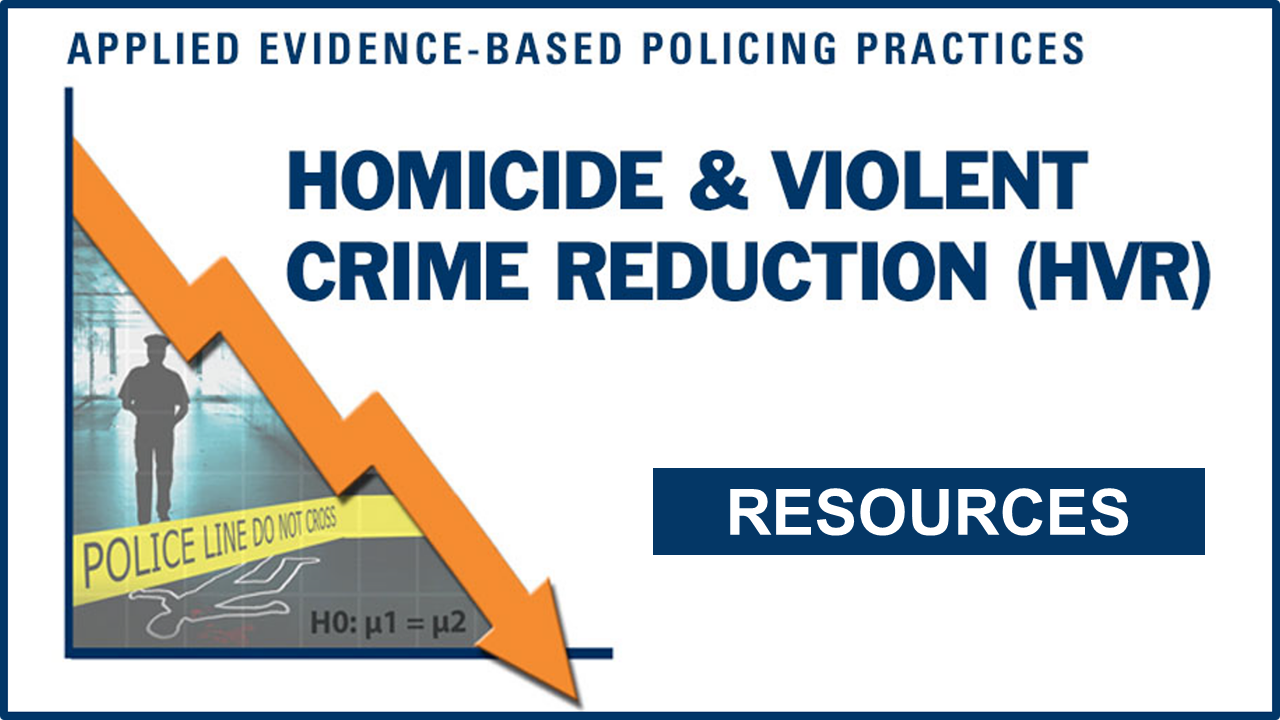
Over the past two decades, violent crime has been steadily declining. Yet the impact of homicide and violent crime remains a significant challenge for our nation’s communities. With long-term social implications and staggering economic consequences, homicide and violent crime reduction remains the top priority for policing agencies throughout the nation. The challenge for many agencies is addressing violent crime with interventions and countermeasures that are demonstrated to be effective. To address this challenge, NCPI partnered with the USDOJ, COPS Office to develop Applied Evidence-Based Policing Practices: Homicide and Violent Crime Reduction (HVR), a multi-faceted program which provides classroom training, online training, and a multitude of resources for police managers and decision makers. Based on the fundamental premise that research and evidence should guide organizational decision making, our goal for the HVR program is to increase your knowledge of current evidence-based practices and ways to implement them into your agency’s homicide and violent crime reduction efforts.
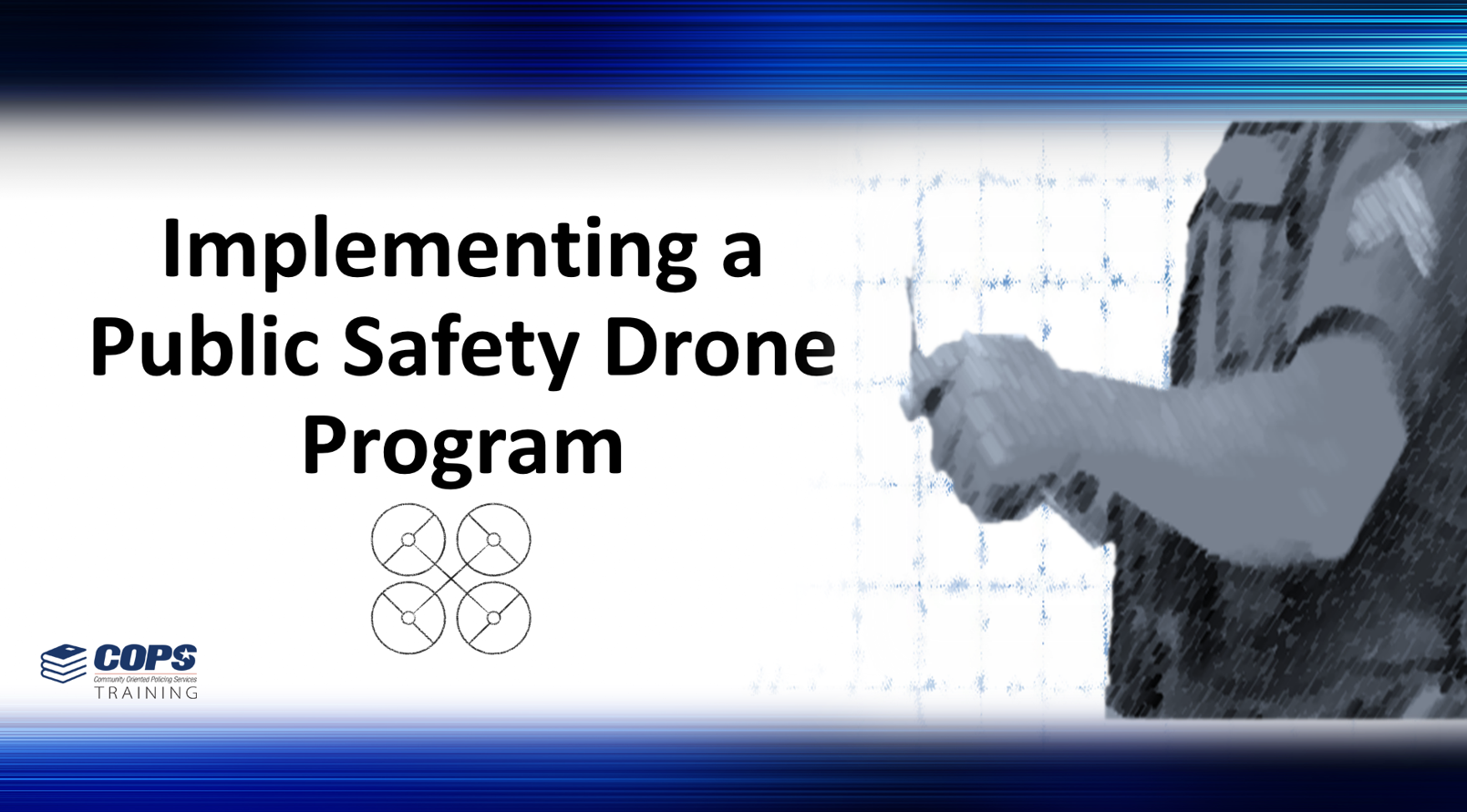
NOTE: This is a free resource, NOT an eLearning course. There is no pretest or posttest, and you will not receive a certificate of completion for reviewing this resource.
Resource Overview:
Recently, a growing number of agencies have explored the use of drones as a promising new practice. To help guide public safety agencies through the process of establishing and implementing successful drone programs, the US Department of Justice’s Office of Community Oriented Policing Services has partnered with the Virginia Center for Policing Innovation (VCPI) to create and make available the Implementing a Public Safety Drone Program: Instructor-led Training Support Package (Drone ILTSP).
Developed as a comprehensive training resource for in-person instruction, Drone ILT provides direct access to instructional materials addressing drone program implementation in a public safety setting. Specifically, the Drone ILTSP includes downloadable versions of the following:
- Instructor Guide complete with a researched and cited instructional script
- Participant Guide that includes notes, exercises, and activity pages
- Pre- and post-course assessment and corresponding answer key
- Course media (case study videos) in standard, closed captioned (CC), and audio-description (AD) versions
Appropriate for delivery as an 8-hour, in-person training or segmented modular training, the Drone ILTSP course includes an examination of current credentialing requirements, the evolving nature of drone technology and associated regulations, as well as guidance for determining the scope of resources needed for successful implementation. All materials are designed to be fully accessible (508 compliant) and focus on engaging participants through carefully crafted discussions, activities, and case studies that encourage participants to learn from the experiences and insights shared by featured practitioners on the ways they use drone programs to support and enhance their service to the community.
Target Audience: Public safety agencies interested in implementing a drone program, police agencies, sheriff’s departments, fire and rescue services, and other public safety stakeholders.
Cooperative Partners: This project was developed by the Virginia Center for Policing Innovation (VCPI) and was supported by cooperative agreement 2020-CK-WXK-050 by the U.S. Department of Justice, Office of Community Oriented Policing Services (COPS).
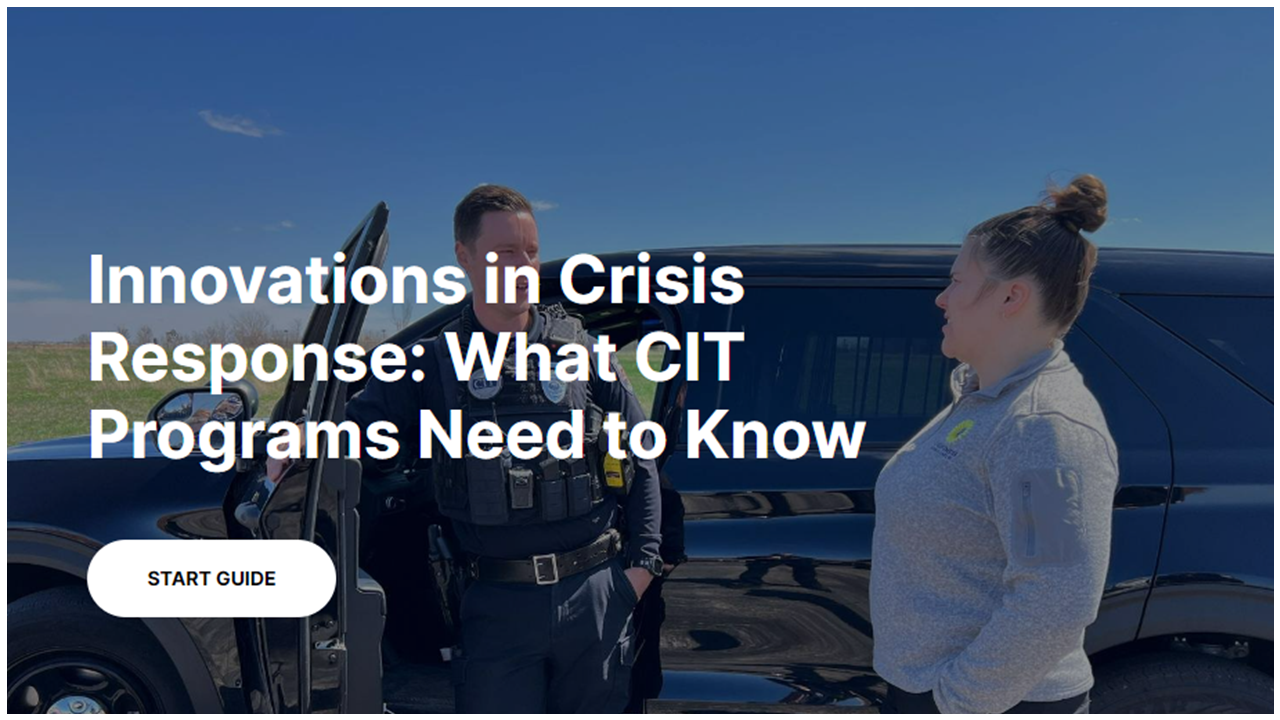
Course Overview: Innovations in Crisis Response: What CIT Programs Need to Know, an e-Guide, features the latest practices in crisis response and provides case study examples of communities leading the way.
Recently, innovations in crisis response have made it possible for local communities to increase their capacity for responses that do not place responsibility solely on law enforcement. The e-Guide highlights trends in crisis response including 988 – the national crisis line number, law-enforcement and mental health co-response teams, growth of non-law enforcement community responders, and mobile crisis teams for children and youth. Each innovation is illustrated by an in-depth case study of a community or state program which includes audio interviews, commentary by experts in the field, lessons learned, links to outside resources and organizations, and a checklist of next steps for local CIT leaders interested in bringing these innovations to their communities.
Target Audience: Law enforcement agencies and practitioners, as well as mental health agencies and practitioners, telecommunicators, crisis line staff, mental health advocates and other community organizations.
Cooperative Partners: This tuition-free online resource was developed by the National Center for Policing Innovation (NCPI) and was originally supported by cooperative agreement 15JCOPS-21-GK-02306-SPPS by the U.S. Department of Justice, Office of Community Oriented Policing Services.

Nationally, threats against judicial personnel have quadrupled in the last decade. The judges themselves are not the only ones in danger. Judges’ families are also being targeted as a direct threatening tactic and more attacks are occurring in the judges’ homes. Creating awareness and providing resources is critical to securing the judiciary and their families. In response, NCPI is proud to offer the Judicial Security Specialist Development Program (JSSDP), which consists of comprehensive training (onsite and online) incorporating evidence-based strategies and best practices, as well as corresponding tools and resources that law enforcement professionals can use immediately to enhance the personal safety and security of judicial personnel and their families, while at home, during travel, and in the court setting.

The MWM e-Guide is designed to be simple and easy to use! It is divided into five sections. This first section offers an overview of the e-Guide, its use, and the partnership that made it possible. Each of the next four sections provide information, guidance, and resources on a topic important to public safety. These topics include violent crime reduction, organizational culture, officer safety and wellness, and measuring and sustaining success. Although these areas may seem unrelated, they are actually intertwined components of police effectiveness. Each one influencing and impacting the other in ways that are sometimes obvious, other times subtle, but undoubtedly relevant to the complex work of policing. Ultimately, the purpose of the MWM e-Guide is to be your resource for obtaining insights and guidance from police practitioners and experts on topics that matter to you.

In addressing the challenges facing the Lakota people on the Pine Ridge Reservation in South Dakota, the Oglala Sioux Tribe embraces Akicita; a community-based approach to public safety that has been a part of the Lakota people for centuries. The Akicita are the guardians. Akicita is a shared responsibility among all community members. Akicita is community policing. For the Lakota people there is hope for the future in remembering the past.

NOTE: This is a free resource, NOT an e-learning course. There is no pre-test, post-test or assessments to complete. You will not receive a certificate of completion for reviewing this resource. Resources may be used in whole or in part based on your training delivery needs.
This project was developed by the National Center for Policing Innovation.
Resource Overview:
In the Spring of 2023, community partners in Knoxville, TN launched the first local My Voice. Our Community. campaign in an effort to raise awareness about the ways community members would get involved in reducing the violence around them. Spearheaded by the Mayor's office, they used My Voice. Our Community. as a messaging tool that unifies the city's existing violence reduction programs and spreads awareness that everyone has a voice, every voice matters, and together our voices can make a difference.
Target Audience:
These resources are intended for anyone wishing to improve community involvement in violence prevention. That can include community organizers, local government officials, or local police.
